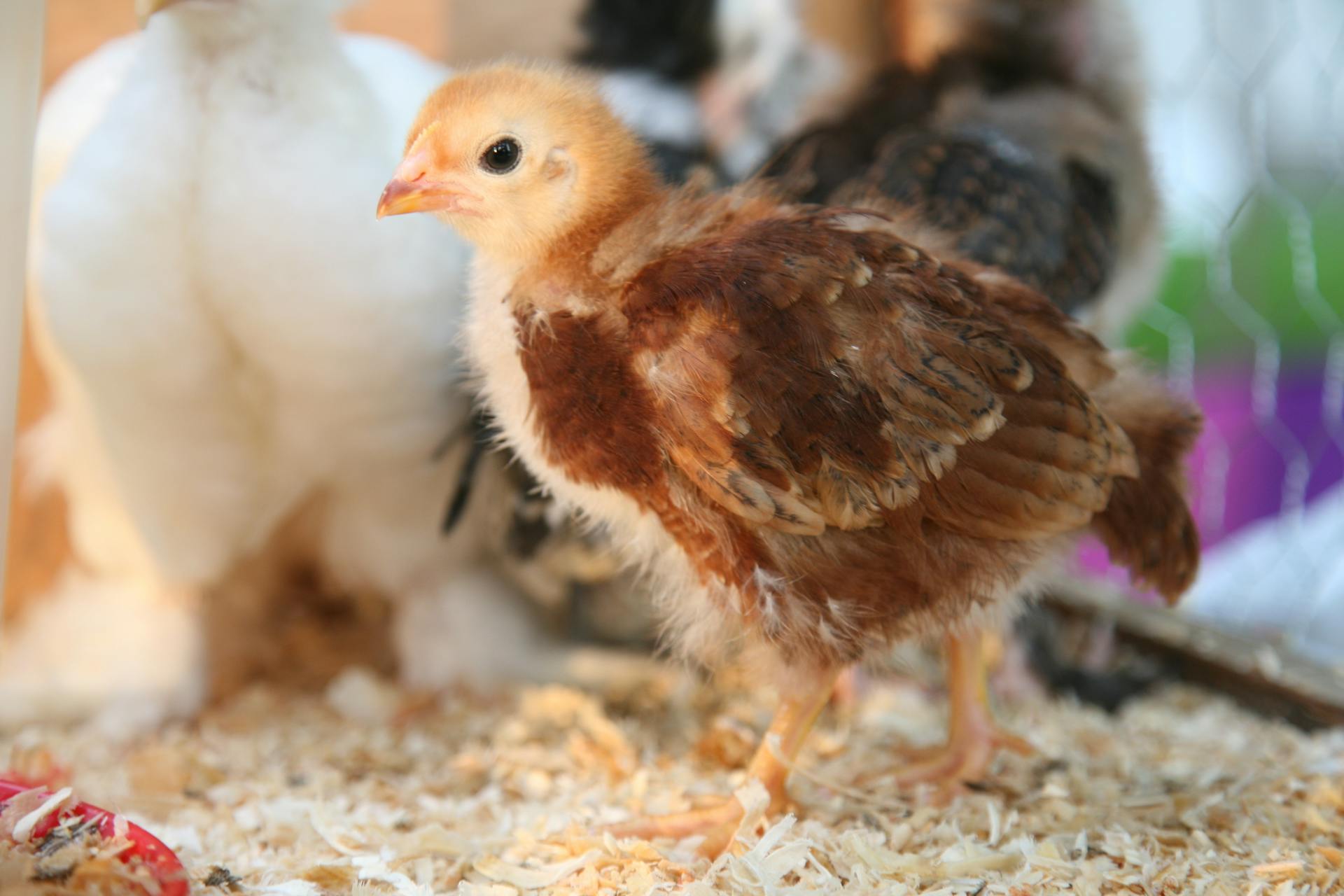
Infectious tracheobronchitis, also known as kennel cough, is a highly contagious respiratory disease that affects dogs.
It's caused by a combination of viruses and bacteria, with the most common culprits being Bordetella bronchiseptica and parainfluenza virus.
The disease is highly contagious and can spread quickly through dog-to-dog contact, as well as through contaminated surfaces and air.
Symptoms include a persistent cough, which can be dry or productive, and can last from a few days to several weeks.
The cough can be accompanied by other symptoms such as sneezing, runny eyes, and lethargy.
In severe cases, the disease can lead to secondary bacterial infections, which can be life-threatening if left untreated.
Prevention is key, and the best way to prevent infectious tracheobronchitis is through vaccination, which can reduce the severity and duration of the disease.
Additional reading: Can Humans Spread Kennel Cough to Dogs
What Is Infectious Tracheobronchitis?
Infectious tracheobronchitis, also known as kennel cough, is a common respiratory disease in dogs.
It's caused by a variety of infectious agents, including viruses and bacteria, with Bordetella bronchiseptica being one of the most common bacteria associated with the condition.
The disease affects the trachea and bronchi, leading to inflammation and irritation of the upper airway.
Kennel cough can be spread rapidly in places where dogs are in close proximity to each other, such as kennels, dog parks, and boarding facilities.
Dogs can contract the disease through direct contact with an infected dog or through contact with shared items or objects that have the infected droplets on them.
Mortality rates for kennel cough are very low, but it can lead to more serious secondary infections in vulnerable pets, such as young puppies, senior dogs, or dogs with a weakened immune system.
The disease causes symptoms such as a persistent cough, runny nose, and loss of appetite, but in most cases, it's not serious for dogs in good health.
Consider reading: Tracheobronchitis in Dogs
Causes and Transmission
Infectious tracheobronchitis, commonly known as kennel cough, is a complex condition caused by multiple infectious agents, often involving bacteria like Bordetella bronchiseptica, Mycoplasma spp., and Streptococcus zoopidemicus, as well as viruses such as adenovirus-2 and parainfluenza.
The exact cause of kennel cough can be difficult to diagnose, especially if the pet is responding well to treatment, but multiple pets are involved or the condition is severe. This is because the pet's environment and immune response play a significant role in the development of the condition.
Kennel cough is primarily spread through the air, as infected dogs release thousands of microscopic contaminants into the air through coughing, sneezing, barking, or even shedding dander. These aerosolized bacteria and viruses can remain viable for extended periods, even weeks or longer, clinging to dust particles and traveling throughout the environment until inhaled by another host.
What Causes?
Kennel cough can be caused by a variety of infectious agents, often involving multiple culprits at once. This makes diagnosis tricky, and it's not uncommon for the exact cause to remain unknown unless the pet's condition is severe or treatment isn't working.
Bordetella bronchiseptica is a common bacteria responsible for kennel cough, but in most cases, other bacteria or viruses are also involved. Mycoplasma spp. and Streptococcus zoopidemicus are other bacterial causes, while adenovirus-2, parainfluenza, corona respiratory virus, herpes virus, and neumovirus are possible viral causes.
The pet's environment and immune response play a significant role in developing the clinical condition, just like in humans when exposed to a cold virus.
How Is Transmitted?
Kennel cough can be transmitted through multiple routes, but primarily through the air. The bacteria and viruses are released into the air when an infected dog coughs, sneezes, barks, or even sheds dander.
These microscopic contaminants can remain viable in the air for extended periods, even up to weeks or longer. They cling to tiny dust particles and travel throughout the environment until inhaled by another host.
Contact with contaminated objects or people can also spread kennel cough. Bacteria like Bordetella can survive on surfaces for up to 48 hours, waiting to be transmitted to another unsuspecting host.
Direct contact with infected dogs can also cause transmission. This can happen through touching noses, playing with friends, or just breathing the same air as an infected dog.
Readers also liked: Dog Cold vs Kennel Cough
Symptoms
Symptoms of infectious tracheobronchitis, also known as kennel cough, can appear within a few days after exposure. The hallmark symptom is a persistent, dry, and hacking cough, often sounding like a goose honk or as if your pet has something stuck in their throat.
Some dogs may also experience sneezing, runny nose, and watery eyes as part of their symptoms. A mild fever can also be present in some cases.
The cough can be especially pronounced when the dog is excited, breathing hard, or pulling on a leash, and can lead to gagging or vomiting in severe cases. In most cases, dogs with kennel cough do not develop symptoms like lethargy, low appetite, or decreased desire to play, and usually do not feel sick.
Here are some common symptoms of kennel cough:
- Persistent, dry, and hacking cough
- Sneezing
- Runny nose
- Watery eyes
- Mild fever
- Loss of appetite
- Lethargy
Common Symptoms
Coughing is the hallmark symptom of kennel cough, and it can be especially pronounced when your dog is excited, breathing hard, or pulling on a leash.
Some dogs with severe coughing may gag or vomit as a consequence of the violent coughing. This can be a distressing sight for any dog owner.
Dogs with kennel cough generally do not develop symptoms like lethargy, low appetite, or decreased desire to play. They usually don't feel sick, which can make it harder to diagnose.
A persistent, dry, and hacking cough is a common sign of kennel cough, often sounding like a goose honk or as if your pet has something stuck in their throat.
Other symptoms can include runny nose, sneezing, lack of energy, decreased appetite, and mild fever.
Here are some common symptoms of kennel cough:
- Persistent, dry, and hacking cough
- Sneezing
- Runny nose
- Watery eyes
- Mild fever
- Loss of appetite
- Lethargy
A dry, hacking cough can be unsettling for dogs and negatively impacts their quality of life. Some dogs may experience a coughing fit every few minutes.
Nasal discharge and watery, runny eyes can be symptoms of kennel cough. The discharge is usually clear but can be slightly cloudy or discolored if there's a secondary infection.
If your dog develops a fever, it may be a sign of a more severe form of the condition.
Recommended read: Nasal Discharge Kennel Cough
How Long Does It Last?
If your dog has kennel cough, it's a good idea to know how long it will last. Most dogs recover from kennel cough within 3–4 weeks.
Dogs with compromised immune systems may take up to 6 weeks to fully recover. This is because their bodies have a harder time fighting off the infection.
The duration of kennel cough can vary depending on the individual dog.
Frequently Asked Questions
Is tracheobronchitis the same as kennel cough?
Kennel cough is another name for tracheobronchitis, a contagious respiratory infection that causes persistent coughing in dogs. Learn more about its symptoms, causes, and treatment options.
What is the difference between tracheobronchitis and bronchitis?
Tracheobronchitis is typically an acute condition, whereas bronchitis can be either acute or chronic. The main difference lies in the duration and treatment approach, with tracheobronchitis often resolving on its own
Is tracheobronchitis the same as Bordetella?
Tracheobronchitis and Bordetella are terms used to describe the same highly contagious upper respiratory condition in dogs. While they are often used interchangeably, Bordetella specifically refers to the bacterial cause of the condition.
Sources
- https://drbarchas.com/kennel-cough-infectious-tracheobronchitis-in-dogs/
- https://en.wikivet.net/Canine_Infectious_Tracheobronchitis
- https://www.brookfarmveterinarycenter.com/post/understanding-kennel-cough-how-it-spreads-from-pet-to-pet
- https://aerapyanimalhealth.com/canine-cough-kennel-cough-in-dogs/
- https://www.ahorb.com/site/blog/2022/05/16/canine-infectious-tracheobronchitis-kennel-cough-in-dogs
Featured Images: pexels.com

